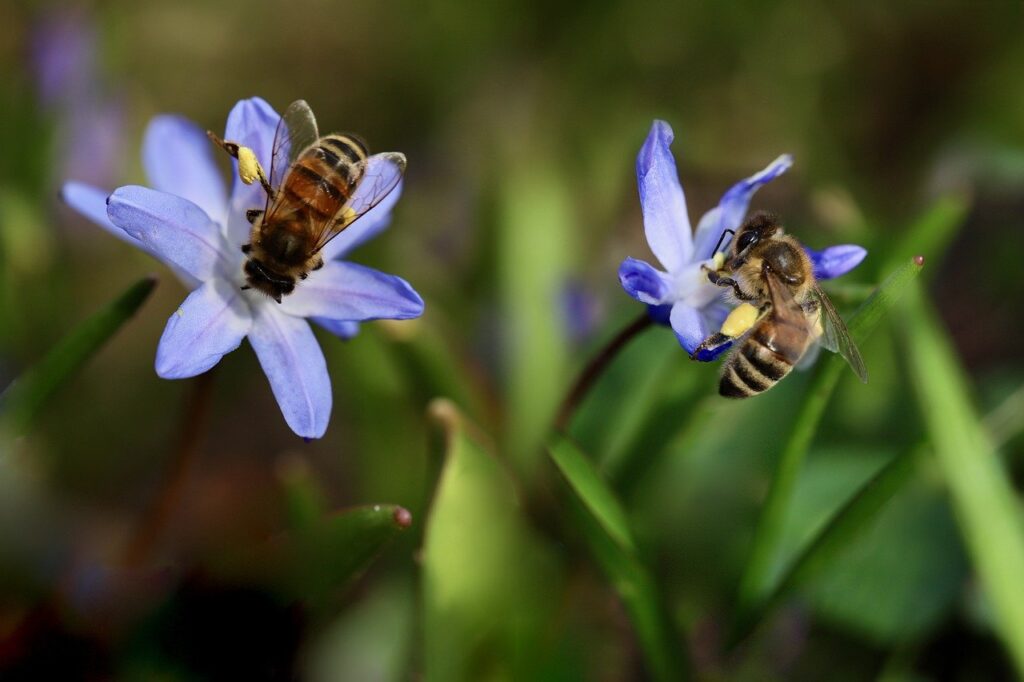Genesis 1:1: “In the beginning, God created the heavens and the earth.”
Jeremiah 2:7: “And I brought you into a plentiful land to enjoy its fruits and its good things. But when you came in, you defiled my land and made my heritage an abomination.”
Isaiah 45:18: “For thus says the Lord, who created the heavens (he is God!), who formed the earth and made it (he established it; he did not create it empty, he formed it to be inhabited!): ‘I am the Lord, and there is no other.'”
Why Bees Are Essential: The Crucial Role of Nature’s Tiny Pollinators
In the grand tapestry of creation, every creature, no matter how small, has a role. Bees, often overlooked and seen as simple nuisances, are among the most important members of our ecosystem. These tiny pollinators are responsible for the health of countless plant species, the food we eat, and the balance of nature itself. Their role reminds us of the intricacies of God’s creation and the interconnectedness of all life.
Here’s why bees are essential and why we must protect them:
- Pollination Powerhouses: Bees are incredibly effective pollinators, ensuring the reproduction of plants by transferring pollen from flower to flower. This process results in the production of fruits, seeds, and countless crops we rely on.
- Biodiversity Boosters: By pollinating various plants, bees promote biodiversity, supporting ecosystems that offer food and shelter for other wildlife.
- Food Production: Many of the fruits and vegetables we consume, such as apples, strawberries, and cucumbers, owe their existence to bee pollination. It’s estimated that one in every three bites of food we take is possible thanks to bees.
- Economic Impact: Agriculture relies heavily on bees, with pollination services valued at billions annually. Without bees, crop yields would drop, and farmers would face significant challenges.
Yet, despite their importance, bees face numerous threats:
- Pesticides: Chemicals used in farming can kill bees or impair their ability to forage.
- Habitat Loss: Urban development and deforestation have destroyed much of the wildflower-rich habitats bees depend on.
- Climate Change: Shifting weather patterns disrupt the timing of plant blooms, impacting bees’ food sources.
- Diseases and Parasites: Mites and other parasites can decimate bee populations.
How can we help? Simple actions make a difference:
- Plant bee-friendly gardens with native flowers.
- Support local beekeepers by purchasing honey.
- Avoid pesticides in your garden.
- Advocate for bee conservation and sustainable farming practices.
Just as bees work tirelessly to sustain the planet’s balance, we too are called to be stewards of God’s creation, nurturing and protecting the life that sustains us all.
The Importance of a Healthy Ecosystem: Why It Matters and How We Can Protect It
In a world driven by technological advancement and industry, we mustn’t forget the fundamental importance of a healthy ecosystem. These systems, built by God’s design, provide everything we need to survive: clean air, water, fertile soil, and biodiversity. But just like bees, ecosystems are under threat.
What makes an ecosystem healthy? A thriving one consists of:
- High Biodiversity: A rich variety of plant, animal, and microbial life.
- Balanced Interactions: Predators, prey, and plants living in harmony, keeping each other in check.
- Efficient Processes: Nutrient cycling, natural water filtration, and pollination all occur smoothly in a healthy ecosystem.
- Resilience: Strong ecosystems can recover from disturbances, whether natural or man-made.
Here’s why the health of ecosystems matters:
- Human Well-Being: Ecosystems provide vital services, from clean air and water to resources like timber and medicinal plants.
- Climate Regulation: Forests, wetlands, and oceans play critical roles in regulating the Earth’s climate by absorbing carbon dioxide, moderating temperatures, and maintaining water cycles.
- Biodiversity: Every species plays a part. When we lose biodiversity, we risk disrupting the delicate balance of nature and inviting crises like crop failures or disease outbreaks.
- Economic Value: Agriculture, pharmaceuticals, and many other industries depend on healthy ecosystems. Losing these systems would harm the global economy and reduce the availability of natural resources.
How can we protect and promote a healthy ecosystem?
- Conserve Natural Habitats: Protect forests, wetlands, and oceans from destruction and degradation.
- Support Biodiversity: Participate in initiatives to preserve endangered species and restore damaged habitats.
- Reduce Pollution: Limit waste, recycle, and advocate for policies that reduce emissions and clean up polluted environments.
- Promote Sustainable Practices: Encourage responsible agriculture, fishing, and forestry that doesn’t deplete resources.
Our role, as caretakers of creation, is to honor the balance that God has set in place. Each action we take—whether it’s planting a garden, reducing our waste, or advocating for change—can contribute to the health of the Earth and all who depend on it. We are reminded in Isaiah 45:18 that God formed the Earth to be inhabited. It is our responsibility to protect it, ensuring its resilience and vitality for generations to come.
Conclusion
Whether it’s the bees buzzing in the garden or the vast ecosystems that sustain our world, all of creation is a reflection of God’s divine plan. Each part plays a role, no matter how small or seemingly insignificant. By taking steps to protect and nurture both the tiny pollinators and the vast ecosystems they help support, we are living out our call to be stewards of this precious Earth.
Let us remember the words of Genesis, that in the beginning, God created the heavens and the Earth—and it is up to us to care for what He has entrusted to us.
Trusted sources:
